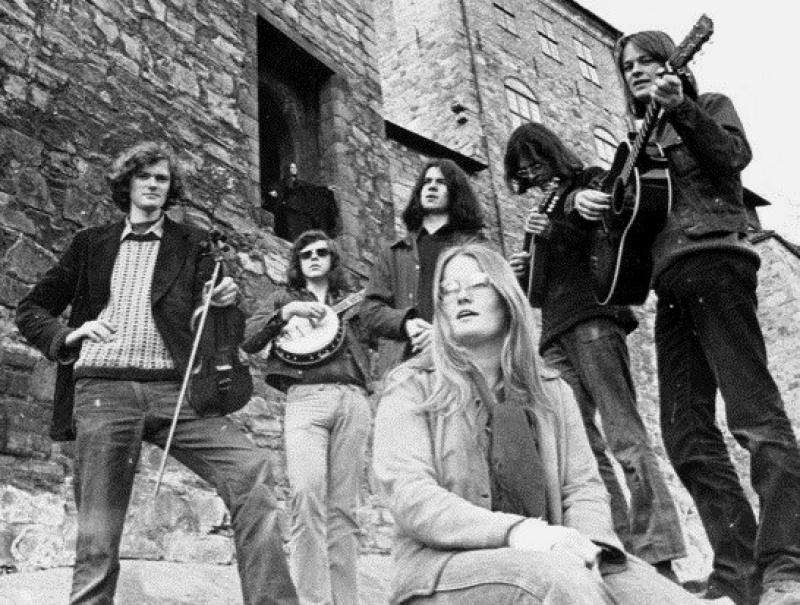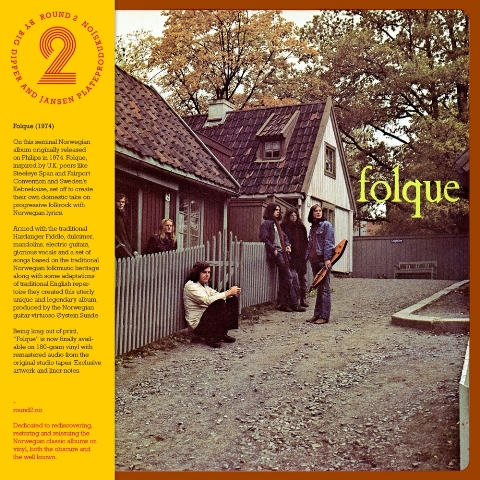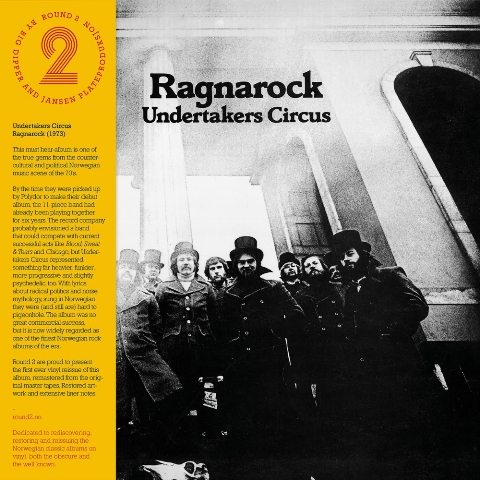Reissue CDs Weekly: Folque, Undertakers Circus | reviews, news & interviews
Reissue CDs Weekly: Folque, Undertakers Circus
Reissue CDs Weekly: Folque, Undertakers Circus
A pair of Seventies albums confront Norway with its identity

The names may be unfamiliar, but Folque and Undertakers Circus are as good as better-known bands. Despite being musical bedfellows neither Norwegian band is as esteemed as, say, Trader Horne and Trees or Colloseum and Lighthouse. Folque issued their eponymous debut album in 1974. Despite line-up changes, the band was active until 1984. Undertakers Circus issued two albums, the first of which was 1973’s Ragnarock. The original band ran out of steam around 1976.
Folque played a folk rock drawing on traditional Norwegian music from 18th-century story-songs to dance instrumentals. They also looked outside Norway for Celtic songs collected in the Child Ballads. Their instruments included Hardanger fiddle and dulcimer. As fellow travellers on the path followed by Fairport Convention since 1969’s Liege & Lief they were a rarity in their home country. Norway did not initially have a comfortable synergy between the worlds of folk and rock.
 The Norwegian pioneers were Prudence (named after The Beatles’ song “Dear Prudence”), who had formed in 1969. They incorporated folk elements into their sound, especially by featuring the accordion. Folque formed in 1973, but the band which first brought the rigorously traditional onto the rock stage was Saft. At 1973’s Ragnarock Festival – Norway's first rock festival – they were joined by Hardanger fiddle player Sigbjørn Osa, the future founder of the Ole Bull Academy. Although the Saft-Osa collaboration resulted in a record capturing their performance, in 1974 the television music awards show Spellemannsprisen wouldn’t allow them to play together. They were given separate spots on the programme. Folk was folk, and rock was rock.
The Norwegian pioneers were Prudence (named after The Beatles’ song “Dear Prudence”), who had formed in 1969. They incorporated folk elements into their sound, especially by featuring the accordion. Folque formed in 1973, but the band which first brought the rigorously traditional onto the rock stage was Saft. At 1973’s Ragnarock Festival – Norway's first rock festival – they were joined by Hardanger fiddle player Sigbjørn Osa, the future founder of the Ole Bull Academy. Although the Saft-Osa collaboration resulted in a record capturing their performance, in 1974 the television music awards show Spellemannsprisen wouldn’t allow them to play together. They were given separate spots on the programme. Folk was folk, and rock was rock.
In this vexed climate, Folque made an album with a rock edge in its rhythms: especially apparent in the drums of Thor Andreassen who was brought into their line-up from the progressive band Popul Vuh (not the cosmic German band) for the studio work. The ensemble arrangements and dynamic interplay also bring urgency. Folque drove each track with the kineticsm of a rock band. They had another ace in singer Lisa Helljesen, whose clear tones sailed above the meshed instruments. Apart from an uncomfortably stilted reading of the Scottish instrumental “Alison Gross”, the album is a winner. Whatever the television bigwigs thought about the barriers between the two, Folque proved to Norway that folk and rock did not have to be kept apart.
As jazz-rockers with soul leanings, Undertakers Circus seem less contentious. Ragnarock, though, was sung in their native language rather than English. This was new for Norwegian rock. In the main, schlager used Norwegian but rock was delivered in English. Undertakers Circus' choice of language was a political gesture, marking themselves as about and for Norway. Two of Ragnarock's songs set the poetry of the working-class, Communist poet Rudolf Nilsen to music. In 1921, Nilsen was arrested and put on trial for bringing supposedly revolutionary literature into the then recently independent Norway. Another song on the album is about the battle of Stiklestad which, in AD1030, was integral to the introduction of Christianity to Norway. Undertakers Circus took their album’s name from Ragnarök rather than the festival. Their Ragnarock was the battle in Norse mythology which predicated the rebirth of the world.
 In bringing national identity to rock, neighbouring Sweden was ahead of Norway and had evolved what would be termed the progg movement around 1968/69: musicians with often esoteric takes on what they did who sang in Swedish and often drew on folk. Reclaiming what it was to be Swedish unwittingly provided a neat counterpoint to the international-styled pop of ABBA. For Norway, Undertakers Circus were akin to a home-grown progg band.
In bringing national identity to rock, neighbouring Sweden was ahead of Norway and had evolved what would be termed the progg movement around 1968/69: musicians with often esoteric takes on what they did who sang in Swedish and often drew on folk. Reclaiming what it was to be Swedish unwittingly provided a neat counterpoint to the international-styled pop of ABBA. For Norway, Undertakers Circus were akin to a home-grown progg band.
Ragnarock opens with a blast of guitar akin to that driving Faces’ “Stay With me” and, as the title track beds in, adds horns to set a soul-rock groove which could have graced the stage of an American ballroom of the period. Despite their chosen musical style, the language barrier meant Undertakers Circus had no chance of breaking through in the Anglophone world. These days, “På Stiklesta” sounds like one for acid jazz fanciers. The only wrong moves are the two final tracks: the truly awful doo-wop take-off “Arbeideløs jul igjen” and “Mor Norge”, a patriotic but messy boogie.
Folque and Ragnarock come on vinyl only. Folque was actually reissued in May last year and Ragnarock in January this year, but each is only just being marketed internationally. The packages are good and the mastering is punchy. The only real niggle is that the inner bags lack full liner notes. Instead, each bears a short English-language reminiscence about the album. A full, contextualising essay with input from band members would have been good. Also, the obi-style yellow strip folded around each album is fixed to the sleeve with blobs of a jelly like adhesive, something the label really should rethink. Although great care was taken with removing it, the sleeve of the review copy of Ragnarock now has a 2mm rent in its surface. Be very careful. But these are not reasons to not get these. Even without knowing the full stories and the agendas at play, both albums are a treat.
Share this article
The future of Arts Journalism
You can stop theartsdesk.com closing!
We urgently need financing to survive. Our fundraising drive has thus far raised £49,000 but we need to reach £100,000 or we will be forced to close. Please contribute here: https://gofund.me/c3f6033d
And if you can forward this information to anyone who might assist, we’d be grateful.

Subscribe to theartsdesk.com
Thank you for continuing to read our work on theartsdesk.com. For unlimited access to every article in its entirety, including our archive of more than 15,000 pieces, we're asking for £5 per month or £40 per year. We feel it's a very good deal, and hope you do too.
To take a subscription now simply click here.
And if you're looking for that extra gift for a friend or family member, why not treat them to a theartsdesk.com gift subscription?
more New music
 Music Reissues Weekly: The Pale Fountains - The Complete Virgin Years
Liverpool-born, auteur-driven Eighties pop which still sounds fresh
Music Reissues Weekly: The Pale Fountains - The Complete Virgin Years
Liverpool-born, auteur-driven Eighties pop which still sounds fresh
 Album: Indigo de Souza - Precipice
US singer's fourth ups the pop ante but doesn't sacrifice lyrical substance
Album: Indigo de Souza - Precipice
US singer's fourth ups the pop ante but doesn't sacrifice lyrical substance
 Album: Mádé Kuti - Chapter 1: Where Does Happiness Come From?
Lively new album from the third generation of Nigeria's first musical family
Album: Mádé Kuti - Chapter 1: Where Does Happiness Come From?
Lively new album from the third generation of Nigeria's first musical family
 The Human League/Marc Almond/Toyah, Brighton Beach review - affable 1980s-themed seaside package
Retro pop extravaganza bolstered by a (mostly) balmy evening
The Human League/Marc Almond/Toyah, Brighton Beach review - affable 1980s-themed seaside package
Retro pop extravaganza bolstered by a (mostly) balmy evening
 Album: Alice Cooper - The Revenge of Alice Cooper
The original Alice Cooper band are back to fly the flag for all the weirdos
Album: Alice Cooper - The Revenge of Alice Cooper
The original Alice Cooper band are back to fly the flag for all the weirdos
 Album: Paul Weller - Find El Dorado
Inspiring curation of some pretty great covers, and hints of majesty
Album: Paul Weller - Find El Dorado
Inspiring curation of some pretty great covers, and hints of majesty
 Album: Spafford Campbell - Tomorrow Held
The young duo extend folk’s boundaries into an expansive contemporary chamber music
Album: Spafford Campbell - Tomorrow Held
The young duo extend folk’s boundaries into an expansive contemporary chamber music
 Music Reissues Weekly: Mike Taylor - Pendulum, Trio
The return of two idiosyncratic, uncompromising Sixties British jazz rarities
Music Reissues Weekly: Mike Taylor - Pendulum, Trio
The return of two idiosyncratic, uncompromising Sixties British jazz rarities
 Youssou N'Dour and Super Étoile de Dakar, Roundhouse review - the best of Africa
Senegalese musical magic as potent as ever
Youssou N'Dour and Super Étoile de Dakar, Roundhouse review - the best of Africa
Senegalese musical magic as potent as ever
 Album: Bonnie Dobson & The Hanging Stars - Dreams
A remarkable collaboration across the ages
Album: Bonnie Dobson & The Hanging Stars - Dreams
A remarkable collaboration across the ages
 Album: Alex Warren - You'll Be Alright, Kid
Plastic-bombastic TikTok pop euphoria for the emotionally incontinent
Album: Alex Warren - You'll Be Alright, Kid
Plastic-bombastic TikTok pop euphoria for the emotionally incontinent
 Album: Slikback - Attrition
Decades-deep electronic darkness from Kenyan sculptor of dystopias
Album: Slikback - Attrition
Decades-deep electronic darkness from Kenyan sculptor of dystopias

Add comment